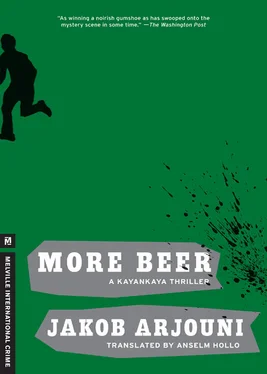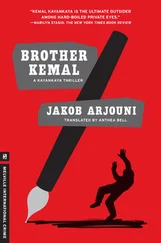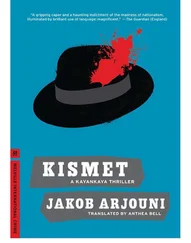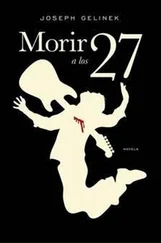Jakob Arjouni - More Beer
Здесь есть возможность читать онлайн «Jakob Arjouni - More Beer» весь текст электронной книги совершенно бесплатно (целиком полную версию без сокращений). В некоторых случаях можно слушать аудио, скачать через торрент в формате fb2 и присутствует краткое содержание. Жанр: Криминальный детектив, на английском языке. Описание произведения, (предисловие) а так же отзывы посетителей доступны на портале библиотеки ЛибКат.
- Название:More Beer
- Автор:
- Жанр:
- Год:неизвестен
- ISBN:нет данных
- Рейтинг книги:4 / 5. Голосов: 1
-
Избранное:Добавить в избранное
- Отзывы:
-
Ваша оценка:
- 80
- 1
- 2
- 3
- 4
- 5
More Beer: краткое содержание, описание и аннотация
Предлагаем к чтению аннотацию, описание, краткое содержание или предисловие (зависит от того, что написал сам автор книги «More Beer»). Если вы не нашли необходимую информацию о книге — напишите в комментариях, мы постараемся отыскать её.
More Beer — читать онлайн бесплатно полную книгу (весь текст) целиком
Ниже представлен текст книги, разбитый по страницам. Система сохранения места последней прочитанной страницы, позволяет с удобством читать онлайн бесплатно книгу «More Beer», без необходимости каждый раз заново искать на чём Вы остановились. Поставьте закладку, и сможете в любой момент перейти на страницу, на которой закончили чтение.
Интервал:
Закладка:
“What is it you want to ask my husband?”
“I want to know why he didn’t see a doctor after someone whacked him on the head.”
She looked at me through the smoke of her cigarette.
“You don’t work for the prosecutor’s office.”
“I don’t? Why not?”
“Because.” She smiled. “I like liars. They’re romantic.”
“I’m a private investigator.”
“Well, there you are.” She got up and took a bottle of vodka off a shelf. She got some ice from the kitchen.
“Would you like a drink?”
I nodded. She filled two hand-made crystal glasses and said, “Cheers.”
It tasted better than any vodka I had ever had. I told her so. She laughed.
“It’s genuine Russian. Contraband.”
On the wall there was a brown photograph of a small girl with long braids. She was dancing on a dining table for an audience of adults.
“You were raised in Russia?”
“Poland. Warsaw. But that’s a long time ago. When I’ve had a few more drinks, you can tell by my accent.”
I liked her matter-of-fact attitude toward drink.
“And what brought you to Doppenburg?”
“Men. What else?”
We finished our drinks, and she refilled our glasses.
“Have you been living here long?”
“Half a lifetime. Back then, you took what you could get. Now it’s too late. Here I am, and here I’ll stay.”
A convulsive cough shook her whole body. She apologized.
“It is horrible to get old. Old people can’t walk too well anymore, they drool and smack their lips when they eat, they spit and cough … Oh, how I hate it.” She drank deeply from her glass. “All right, that’s better.”
I tried to think of a question to take her mind off her cough and her age. Finally I decided to ask her when she had first met her husband. He was, after all, the object of my visit.
“You really want to know?”
I nodded.
“Don’t ask old people about their lives. Their memory is their life, and the less there was to it, the more they have to tell.”
I said that nevertheless I was interested in her story.
She smiled. “But I have to start from the beginning. It’s no fun for me otherwise.”
She poured us another round and leaned back. Then, believe it or not, she told me her life story.
“In nineteen forty-five, I was seventeen years old. I left home at fifteen to make love to a German officer. Had I been older, I would have guessed that things wouldn’t turn out well with that German, but I was young and thought I was betting on a winner. I hated my parents because they didn’t like him, and were proud to be Poles. I wanted to get out of Warsaw. I wanted to see the world. America, China, Russia. I wanted to live. For me, Warsaw was too provincial, even though I had never been to a bigger city. I wanted to become famous, I dreamed of being a great dancer in Berlin. My parents insisted that I should enter an apprenticeship so I could take over the family tailoring business. Well, then the Russians came, my officer was shot dead, and I had to get by somehow. I was too proud to go back to my parents. Those were hard times. For a bag of potatoes, you’d do just about anything. The young Russian soldiers gave me enough to eat, and I entertained them at night. But even the Russians were poor, and their country was a shambles.
“A girlfriend and I decided to go west, to the Americans. We had heard you could really make some money there. A Polish fellow pawned his wife’s jewelry, bought a car, and drove us the first hundred kilometers in the direction of Berlin. Unfortunately, every couple of kilometers he wanted to be rewarded. We got tired of him and took off. A Russian army patrol picked us up and took us to Berlin. They dropped us off in the American sector. There we realized that the pay wasn’t much better than those old potatoes. The Americans were even worse about paying up than the Russians had been-maybe because their wives were still alive. But we did see our first genuine Negro, and we heard jazz. It was the world we had been looking for.
Then one day I met a dashing sergeant, the son of wealthy parents, and I thought this was my big break. I gave up my wicked ways and devoted myself to him. Days I would drink whiskey and mend his uniform, nights we would fantasize about a ranch in California. Unfortunately, I fell in love with him. I became sentimental and believed him when he said that the letters he received were from his sister. I didn’t even notice his preparations for departure. He left me. I followed him to Cologne and Frankfurt, but finally he got on a plane to America, and I was back on the street. I didn’t know anybody in Frankfurt, but it didn’t take me long to get back into my old profession. I made a lot of money. In nineteen fifty-five I moved to Kronberg, where I worked only for regulars. That was a good time. I could afford everything I wanted, and things could have gone on like that …”
She stuck another cigarette into her holder and inhaled deeply. Then she looked up.
“I warned you. It’s been a long time since anyone shared my vodka with me. What’s your name?”
“Kayankaya, Kemal Kayankaya.”
“I thought so. You’re not a German.” She pointed to herself. “Nina Scheigel, nee Kaszmarek.” She laughed. She filled our glasses and continued her story. “Then one of those crazies showed up again, the kind that wanted to make an honest woman out of me. He was handsomer than the others, and he seemed more decent. He had a wife and children, but it was me he wanted. I was twenty-nine at the time, with another good ten years ahead of me. True, it would have been harder as time went on, and there comes a point when you have to pack it in. I didn’t relish the prospect of walking the streets at forty. I accepted his offer. He bought a small apartment for me, here in Doppenburg, and paid me a decent monthly income. His wife knew about the arrangement. He came to see me almost every day. We took little trips, and I began to share his interest in books. I hadn’t become a great dancer, but I had a carefree life. I did not love my patron, and it was better that way. The locals regarded me as a slut. Everybody knew.
“I used to have coffee with his wife, and at some point I got to know his son, a young man of nineteen. We took an instant shine to each other. For me, he was the hope of something new, and I started dreaming about America again. But one night his father caught us in bed together and kicked me out. He sent his son abroad. I followed him, and we had a wonderful time. When his father found out, he no longer sent money to the son, saying he wouldn’t until I was out of the picture. For a while, we had a romantic time in fleabag hotels. But then he went back and entered the university, as his father wanted.
“I still had the apartment in Doppenburg, so I came back here and tried to forget the young man. I wasn’t able to; I ended up spending more time drinking in the taverns than at home, not least because I would meet one of my lover’s friends there. Fred Scheigel. I had first met him on the secret walks I took with my lover. Fred too was young and good-looking, and he had ambitions to leave and move far away from here. Just like me. We moved in together, and finally we got married. We never emigrated. Fred went to work. Then we opened a grocery store, but it didn’t work. We went bankrupt and stopped dreaming.
“My lover returned to take over his father’s business. He didn’t want to have anything to do with me. Then his father suddenly died. He married another woman. And so I end up here, with an old idiot of a husband. The Polish slut. My social life consists of an old Russian in Frankfurt. He gets me this vodka. I’m fifty-eight, but I look ten years older, and I’ll die in this hovel.”
Читать дальшеИнтервал:
Закладка:
Похожие книги на «More Beer»
Представляем Вашему вниманию похожие книги на «More Beer» списком для выбора. Мы отобрали схожую по названию и смыслу литературу в надежде предоставить читателям больше вариантов отыскать новые, интересные, ещё непрочитанные произведения.
Обсуждение, отзывы о книге «More Beer» и просто собственные мнения читателей. Оставьте ваши комментарии, напишите, что Вы думаете о произведении, его смысле или главных героях. Укажите что конкретно понравилось, а что нет, и почему Вы так считаете.












